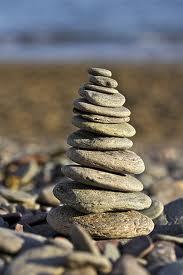
What does it mean that God’s place on earth is refered to as a house?
We turn to the oldest Kabbalistic work, the Sefer Yetzirah. It reads enigmatically:
“Two stones build two houses; three stones build six houses; four stones build twenty-four houses; five stones build one-hundred-and-twenty houses; six stones build 720 houses...(and on and on until) that which the mouth cannot speak and the ear cannot hear.”
What are these mystical mathematics all about? In the code of the Kabbalists, stones are letters and houses are words. Two stone letters thus can build 2 word houses; six letters can make 720 words. Each letter permutation becomes a house – for a house is essentially, a container which holds meaning.
Let's turn back to Jacob’s story with this stone/house imagery in mind. In a curious grammatical shift from plural to singular, we read that Jacob took stones as his pillow and when he awoke in the morning there was but a single stone. He anointed the stone with oil and named the place the House of God.
When we read this with the Kabbalistic imagery of stones building houses it makes perfect symbolic sense that he would call the place the House of God – the multiple stones had miraculously became a single house. Just as disparate letters come together as one comprehensive word. Through the act of placing one's head – or one's intellect or consciousness, upon stone letters, they came together to form a house/a word, a cohesive vessel of meaning2.
This is the divine gift of speech. We bring letters together to form words which somehow, almost magically, communicate meaning. And in this act is something divine. Words become the very house for God in the world.
But the Midrash adds another layer of meaning to this. They tell us that there were twelve stones, representing each of his sons. In the course of the night, these disparate stone/sons were merged into a single stone – representing a complete, unified, household.3 A divine sign that Jacob would indeed succeed in bringing together his fractured household into a completed whole.
And thus the linchpin that unites all of these images of mystical mathematics and linguistic wonders. For it's when we are building our houses, our relationships of deepest meaning, that our every letter, our every word counts. It is the way we construct our words, the way we communicate, that builds, or wrecks, the fragile house of cards of our most intimate relationships. In Hebrew the root letters for children (banim) and for building (boneh) are identical. We build our children by how we speak to them. What's more - our words, chosen consciously, can house God.
Jacob's journey can thus be seen as a model for our own home-making. This week we are invited to look at how we're using our speech to construct our lives. How do we speak to our children, our partners, our parents? How well are we housing God in the world? Our words are the building blocks that make or break the homes in which we live. May we chose them with care.
Twelve Stone
The path was punctured
through with pebbles
which Jacob pocketed
as he passed
and come the darkness
laid upon them
for a pillow at his back
The twelve tone stones
forged through their skin
and sucked the distance
kin to kin
- a monolithic act
Each pebble personed
a perfect letter
smoothed together into word
Jacob with his head upon them
– heard harmony
and understood
A conscious
mansion worth
of meaning
sprouted fast
from speaking stones
Skipped his pebbles
'pon his breathing
built a sentence
worth of home
And now we follow in his footsteps
dream upon that hallowed ground
unify the rips & fissures
with our lips
in rites of sound
Each conversation
is our Temple
here, between our biting teeth
let us build it
strong and simple
1 Pesachim 88a cites the pasuk in Mikha (4:2), "Lekhu ve-na'aleh el har Hashem ve-el beit Elokei Yaakov." "Yaakov was different from Avraham who encountered God on a mountain; he was unlike Yitzchak who prayed to God in a field. Yaakov met God in a house - 'he named that place Beit-El.'" And God chose 'house' as the name.
2 Note that 12 stones can produce 47,900,160 words!
3Bereshit Rabbah 68:13

 RSS Feed
RSS Feed
